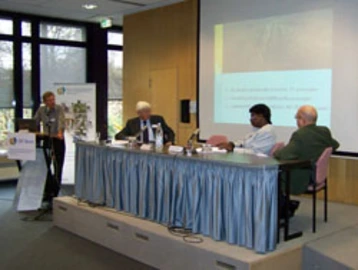Scientific Cooperation with Developing Countries: An international review of the Swiss guidelines
November 13, 2008.
Based on the “Swiss Guidelines”, around 90 scientists and practitioners from more than 50 universities and institutes from Africa, Central Asia, Europe and the US discussed the chances and pitfalls of north-south research partnerships.
On the occasion of the 10th anniversary of the "Swiss Guidelines”, the Volkswagen Foundation initiated this conference on the implementation of these guidelines and other experiences in the field of research cooperation with the developing world. ZEF hosted and organized the two day conference taking place on November 13-14.
Goal of the workshop was to evaluate scientific cooperation between partners from developed countries and those in the developing world and transition countries - with a focus on Africa and Central Asia. The Swiss Guidelines were set up 10 years ago by the Swiss Commission for Research Partnership with Developing Countries. The eleven Principles of Research Partnership include “Build up mutual trust”, “Share information, develop networks”, “Create transparency” as well as “Build on the achievements”.
”There is still a global inequity in science”, said Wilhelm Krull of the Volkswagen Foundation, in his keynote address on the first conference day “in terms of the generation, dissemination and distribution of science as well as of possibilities to recruit talents and have access to funding facilities. Our goal is therefore to raise awareness and increase options for a more symmetric collaboration between the so called developing world and its partners in the north. We want the workshop to contribute to that by, among others, showing and discussing best practice examples of experienced participants from all over the world”.
Working groups discussed intensively the issues of: Project Development, Quality of Collaboration, Increase of Research and Management Capacity and Application and Dissemination of Output. A strong point out of these discussions was that there is a tendency of the north to isolate developing countries into a problem role, whereas it acts itself as the one designing concepts and theories for solving the problems. This issue was also raised by Salome Misana, Professor at University of Dar es Salaam in Tanzania in her key note address. "Most of the time research is initiated by the north, and the south is merely reacting", stated Misana. "What we need are more real partnerships based on mutual trust, more ownership in the south and shared responsibility as well as more transparency, especially on budget issues. The one who has the control over the resources, still has the power to make the crucial decisions", she explained.
Among the lessons to be learned summarized by Ulrich Hiemenz, director at ZEF, is that "despite all efforts to come to a so called symmetric collaboration between the north and south, an essential inequality remains". According to Hiemenz “the discussions during these two days have shown that there is no single recipe for forging a mutual equal partnership. But we have indentified three dimensions to be considered when implementing the Swiss Guidelines: The type of project (long-term vs. short-term, disciplinary vs. inter- or trans-disciplinary etc.), the distinction between disciplines and a third dimension relating to the difference between regions, which is setting different local political and cultural frameworks”.
Downloads:
- Report
- Participants
- Presentation A. Behrends: Introduction to Working Group I: Project development
- Presentation U. Fischer-Zujkov and G. Zimmermann: Increase of Research and Management capacity
- Presentation B. Koelle et al.: Take a Walk on the Wild Side - Stewardship of wild rooibos (Aspalathus linearis) as a climate change adaption strategy
- Presentation P.L.G. Vlek: Introduction to working group 2: Quality of collaboration - ZEF‘s perspective
- Presentation U. Wiesmann: The Swiss Guidelines for Research Partnerships


